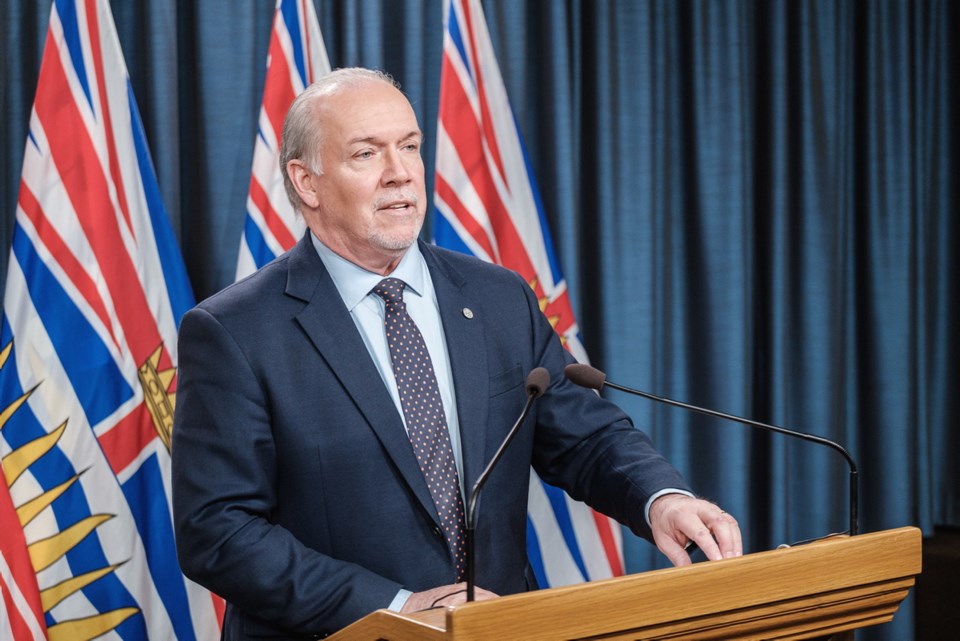The B.C. government will be keeping firm control of any efforts by business and individuals to resume activities now curtailed by health orders. Premier John Horgan said Wednesday it will be a “slow, methodical phased-in approach.” The framework will be unveiled next week, but the actual start date is not yet clear.
Workers and customers in the restaurant industry, one of the hardest-hit sectors, have to have confidence they are safe, he said.
“The only way we built that confidence is to have a set of common protocols, common guidelines in place.”
Such protocols are fully in force at grocery stores and Horgan said measures like them will be the foundation of the plan.
And there will be nothing in the plan about a full reopening of schools. There may be a gradual increase in the small number of students now allowed back in classrooms.
So it appears health restrictions will be in effect for a long time to come, but they may be gradually eased to be less onerous.
As a measure of the control the government will be exerting, the state of emergency was extended Wednesday for at least another two weeks.
Horgan said there are dark indicators the economy will retract. “The world has stopped buying, British Columbians have stopped buying.”
But there are also good indicators for 2021.
He said B.C.’s dynamic workforce, tech sector and film industry can come back more quickly than in other places.
The government still has $1.5 billion earmarked for economic stimulus that hasn’t been used yet and will likely be disbursed this summer and fall.
There are numerous decisions to make on how to adapt to long-term restrictions.
Although Horgan was proud of the fact the construction sector wasn’t shut down as it was elsewhere, it could be eventually curtailed.
New projects in the pipeline need permits and permits often need public hearings, which are in a state of flux around B.C. because of the limits on gathering.
Victoria Mayor Lisa Helps said this week every council in B.C. is waiting for the provincial government to give them marching orders on how to hold those hearings.
Speaking to Greater Victoria Chamber of Commerce CEO Catherine Holt on a webcast, she said it makes no sense for each local government to make up new rules on their own.
She said the Municipal Affairs Ministry has taken some leadership on and “hopefully there’ll be something that comes out very soon in that regard.” The ministry earlier relaxed the requirement for some hearings on minor development issues.
Even if the restrictions are gradually eased, “it’s going to be a very strange summer with few to no tourists here,” Helps said.
The stalled-out tourism sector will be trying to attract visitors from much closer areas, like the north Island, but it will be a longer term recovery.
She expects a much higher retail space vacancy rate.
“One of the things we won’t notice until they’re gone are all the festivals that happen.”
Jazzfest, Pride Parade, Canada Day and other events are cancelled or look unlikely at this point.
“Those are near term impacts that we’re going to be feeling even as things start to open up.”
Helps also tried to rekindle an idea about homelessness she pitched during her election campaign, in the wake of the weekend move to shut down the Topaz Park and Pandora Avenue camps.
The province has arranged over 300 hotel rooms for people from the camps but also committed to a more permanent solution over time.
Helps said modular housing spread across the region would be a good option.
“There’s a real opportunity for the whole region to come together around this.”
Vancouver, with seven modular projects, has shown it can work. “They look and feel like regular apartment buildings. They’re quite beautiful actually.”
The province erected them when civic land was made available. Helps pondered: “Can we get each local government across the region to take one building and see how that goes?”
Holt said the chamber endorses that idea, as it did View Royal’s support for using the former youth detention centre as housing.



